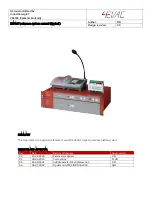
10
11
Important Safeguards
Warnings
• Consult with your doctor before using this device if:
•
You are in the care of a doctor
•
You have a history of heart problems
•
You have had medical or physical treatment for your pain
•
You have suspected or diagnosed heart disease
•
You have suspected or diagnosed epilepsy
•
You are unsure about the suitability of the REVITIVE for you
•
You are unsure about the cause of your symptoms
• If you have a metallic implant, you may experience pain or discomfort near the
implant when applying electrical stimulation, if this should occur discontinue
use and seek advice from your doctor
• The electrical stimulation may feel more intense close to a metallic implant. It is
safe to continue use provided no pain is experienced. You may need to adjust
the intensity to a comfortable level
• If your Arthritis symptoms worsen, or you have had knee surgery (within the last
six months), consult with your doctor before reusing REVITIVE
• Do
not use the Electrode Pads on your head, face, neck or chest
• Do
not apply foot-pads or Electrode Pads directly:
•
on open wounds or rashes, swollen, red, infected, or inflamed areas or skin
eruptions (such as phlebitis, thrombophlebitis, varicose veins, cellulitis)
•
on or close to, malignant tumours
•
on areas treated with radiotherapy (within the past 6 months)
•
on reproductive organs
• Electrode pads are for single person use only. Do
not share with others
• Do
not use the Arthritis Pads in conjunction with a brace or cast without first
consulting with your doctor
• Do
not use Electrode Pads after their use by date
• There is a chance you may experience skin irritation or burns beneath
the Electrodes Pads or hypersensitivity due to the electrical stimulation
• Ensure that moisturiser/gel/balm is evenly applied and thoroughly
Read all instructions before use
Who should not use REVITIVE
REVITIVE should
NOT be used by some people.
Do not use if (contraindications):
•
You are fitted
with an electronic implanted device such as a heart pacemaker
or Automatic Implantable Cardioverter Defibrillator (AICD)
•
You are pregnant
•
You are being treated for, or have the symptoms of, an existing Deep Vein
Thrombosis (“DVT”)
Long periods of inactivity can put you at greater risk of developing Deep
Vein Thrombosis (DVT). DVT is a blood clot and usually occurs in a deep
leg vein. If part of the DVT breaks off it may lead to potentially life-
threatening complications such as pulmonary embolism.
If you have been inactive for prolonged periods and suspect you may
have a DVT, consult your doctor immediately. To prevent dislodging the
clot do not use REVITIVE.
In some cases of DVT there may be no symptoms. However it is important
to be aware of the symptoms that may include:
•
pain, swelling and tenderness in one of your legs (usually your calf)
•
a heavy ache in the affected area
•
warm skin in the area of the clot
•
redness of your skin, particularly at the back of your leg, below
the knee
Consult your doctor as soon as possible if you show any signs of the
above symptoms.
EN
EN
4397_IFU02_16220241.indd 10-11
25/01/2019 14:50







































